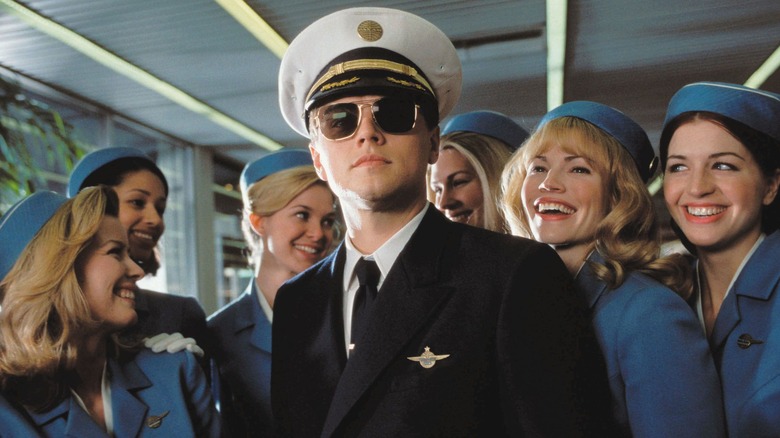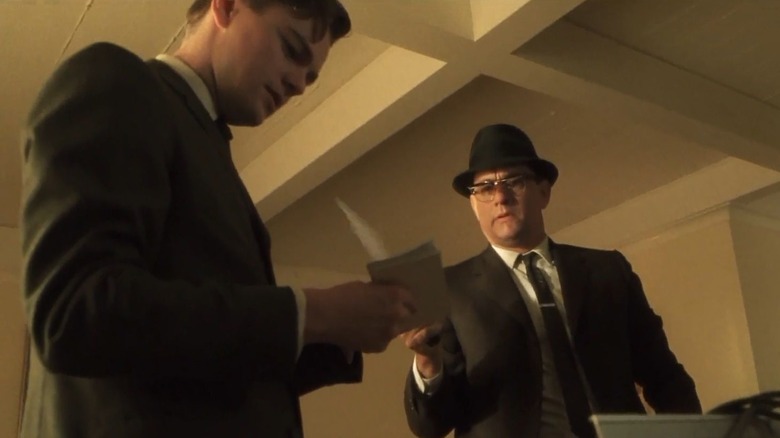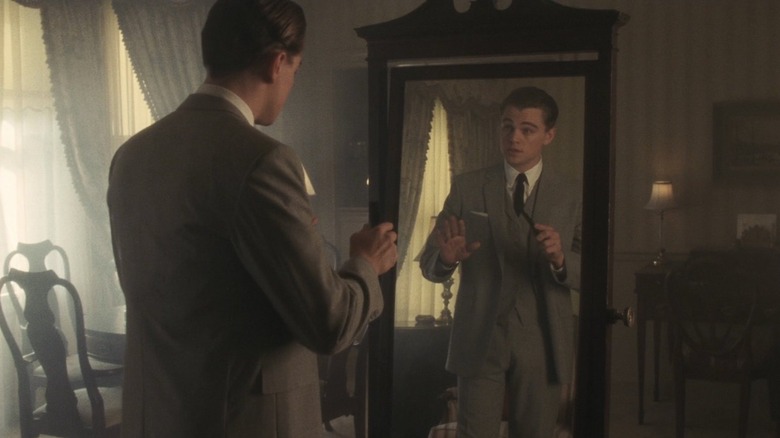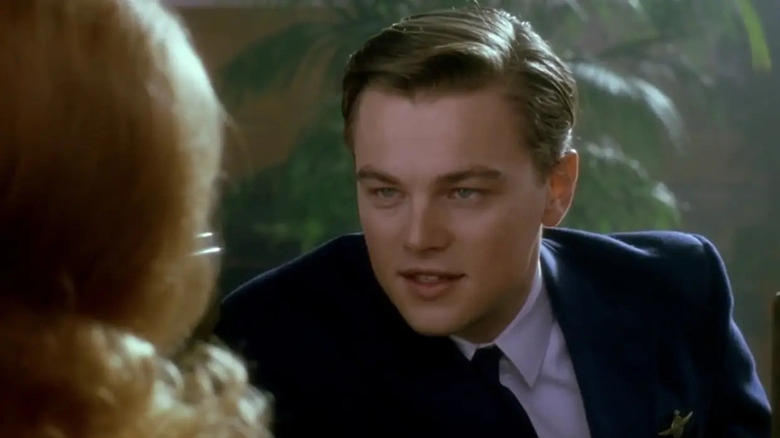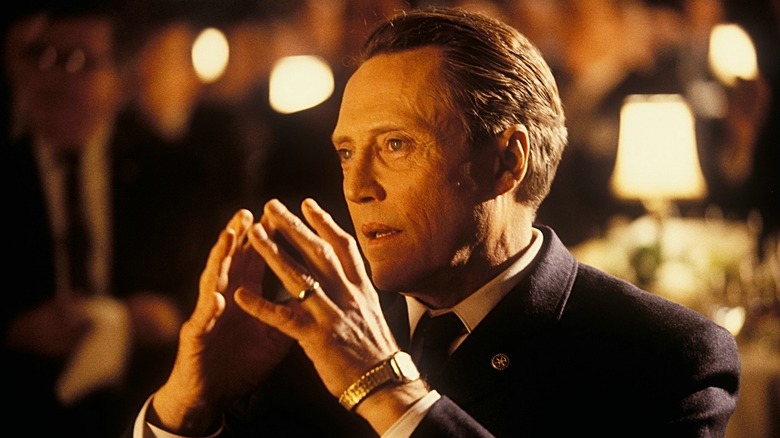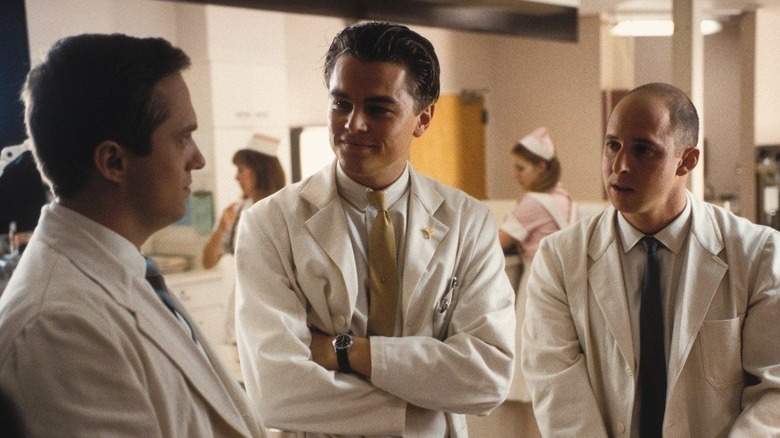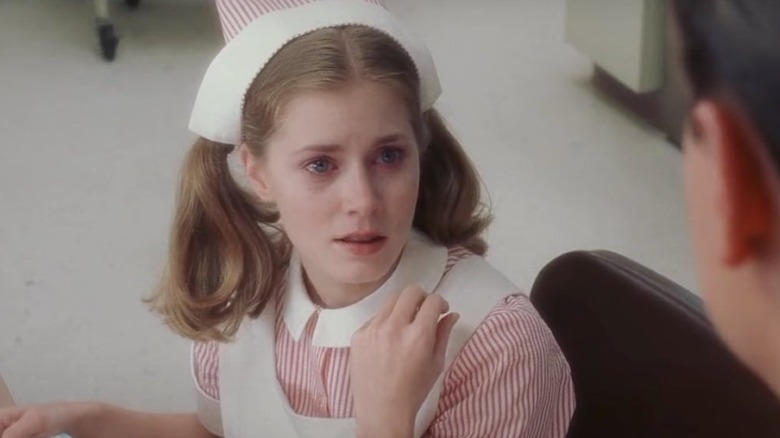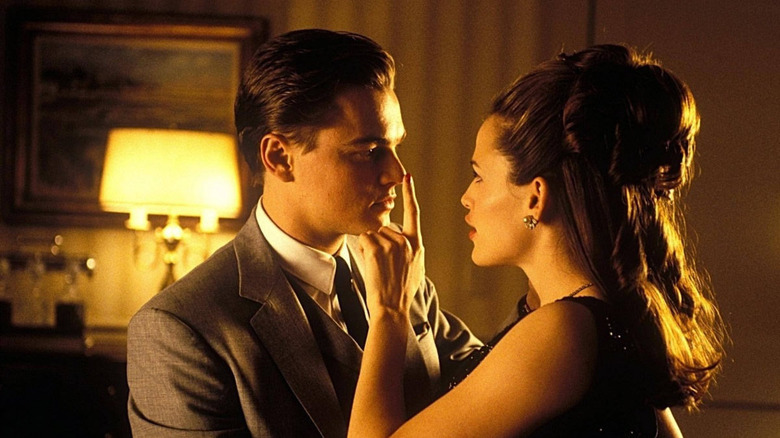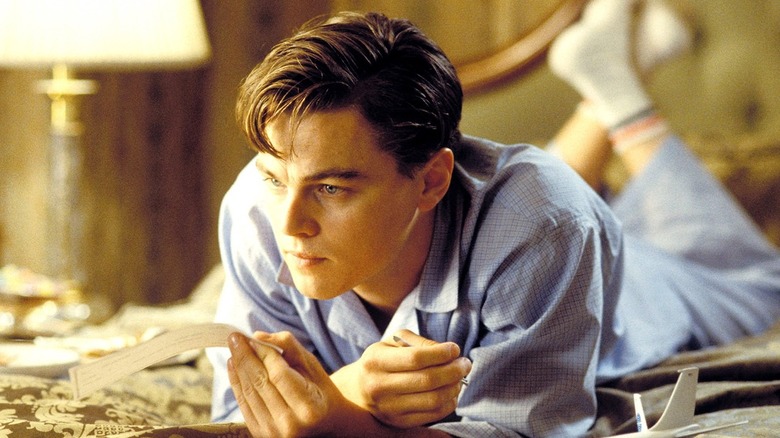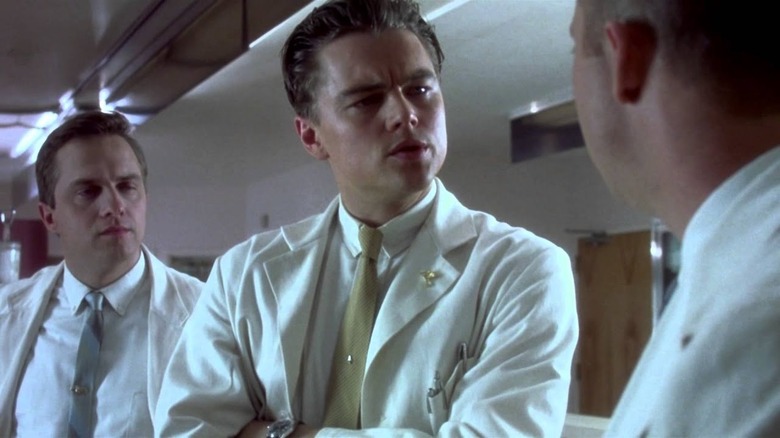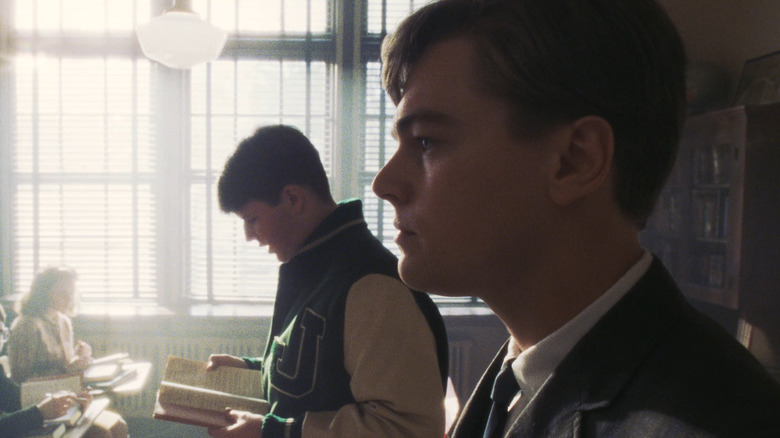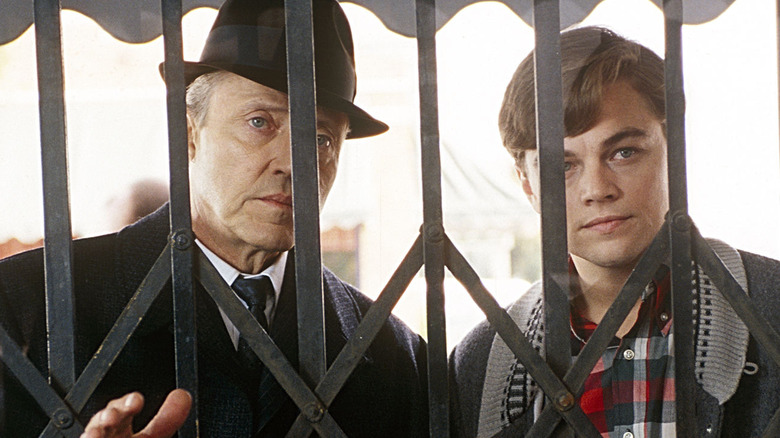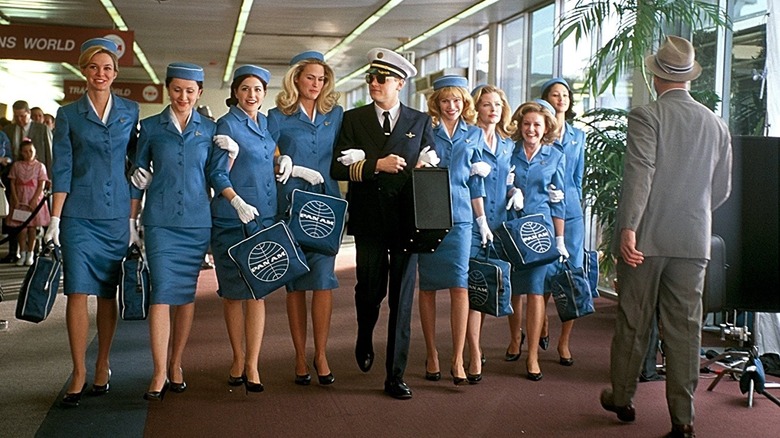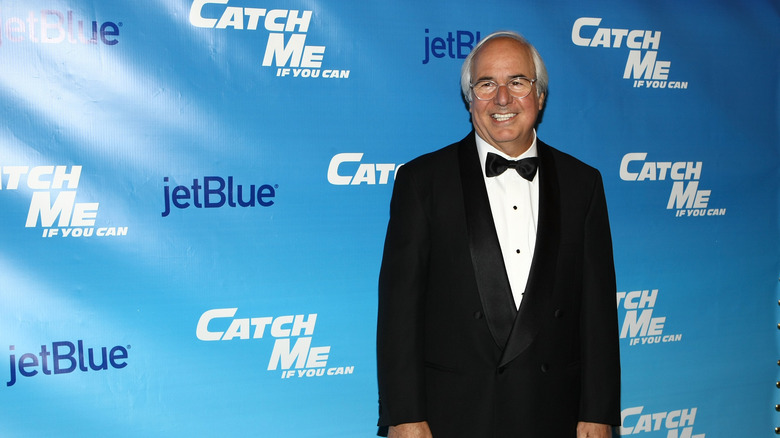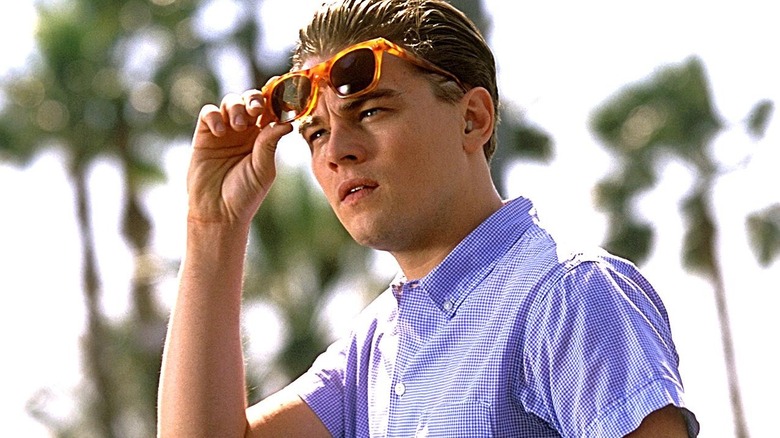The Fascinating True (And Not So True) Story Behind Catch Me If You Can
When you hear Steven Spielberg's name, you probably think of "Jurassic Park," "Jaws," or any given "Indiana Jones" movie. And that's fair, but you shouldn't limit yourself to just the classics. Spielberg has a long filmography and among his many incredible titles is the lesser-acknowledged masterpiece, "Catch Me if You Can," which is the caper you didn't know you needed in your life. Remember when you were a kid, and you dreamed of living life on the run? Not as a dangerous criminal, but as the cool kind that only steals from the government, owns a bunch of fake IDs, and switches between made-up identities with elaborate costume changes? It would be a life of adventure and best of all, it comes without any parental supervision!
Well, bad news fellas. It's way too late to pursue that career path. But on the bright side, we can still live vicariously through 2002 Leonardo DiCaprio. So while I have your attention, let's take a journey behind the scenes and dig into the fascinating story behind this film.
What happens in Catch Me If You Can?
In "Catch Me If You Can," a post-"Titanic" Leonardo DiCaprio is young and as charming as ever, holding his own against greats like Tom Hanks and Christopher Walken. Starring as Frank Abagnale Jr., he puts that roguish charm to very good; over the course of the film, he cons millions of dollars while posing as a pilot for Pan American Airways. He also pretends to be a doctor in Georgia and a prosecutor in Louisiana. Plus — major detail here — he does it all before his 19th birthday.
One of Spielberg's smoothest films, "Catch Me If You Can" is stylish, clever, and fun, breezing right by until it crashes into dark, emotional territory. In typical Spielberg fashion, the movie hides tragedy beneath its facade. We get all the fun of Frank's wild adventure before being stopped in our tracks to confront the pain he's desperate to escape. We learn that at his core, DiCaprio's character is a scared kid, haunted by his parent's broken marriage. The only thing he knows how to do is run far away from his pain — so he spends the entire film putting distance between himself and his problems.
Along with DiCaprio's brilliant performance is Tom Hanks as FBI Agent Carl Hanratty, trying obsessively to hunt the con artist down. Christopher Walken portrays the tragic figure of Frank Abagnale Sr., a role model for his son throughout his childhood. Those three heavy-hitters are plenty, but the movie is full of plenty more stars, including Amy Adams, Martin Sheen, Jennifer Garner, Elizabeth Banks, Nathalie Baye, Ellen Pompeo, and James Brolin.
Are Frank Abagnale Jr. and Carl Hanratty Real?
So here's the big question — is the movie based on a true story? Drumroll, please ... Yes! Sort of. Frank Abagnale Jr. was out there in the '60s and '70s, cashing fake checks and posing as a professional in a bunch of different industries. He began conning at 15 and was hunted by the FBI for years. As for FBI Agent Carl Hanratty, the Tom Hanks character is fictional. Hanratty is said to be a combination of a number of FBI agents who worked to catch Abagnale, but the relationship between the two is loosely based on Frank's relationship with one specific FBI agent, Joseph Shea. According to Abagnale (via City & State), their friendship lasted 30 years, until Shea's death in 2005.
Special Agent Shea was the head of the FBI investigative team chasing after Frank and had spent several years looking for him. While pursuing Abagnale, Shea initially believed his suspect was in his late 20s to mid-30s, because of how sophisticated the crimes and forgeries were. Just like Hanratty in the movie, Shea became Abagnale's most important connection to the FBI: he convinced the agency to use the criminal for undercover work (without pay) to investigate forgeries, frauds, and scam artists.
Now that we've cleared up the big picture, let's get into the nitty-gritty: DiCaprio's Frank gets up to some pretty wild hijinks, making great plane escapes and pulling off wild scams. Naturally, the impulse is to revisit every scene from the movie, squint really hard at the screen and wonder did that really happen? Well, look no further than this article, where we'll walk you through the many lies of "Catch Me If You Can."
Frank wasn't an only child
In "Catch Me If You Can," the lies start well before Frank forges his first check. Before we glimpse the many identities that DiCaprio's Frank Abagnale will eventually assume, we see the kid he was at home: an only child who revered his father and was devastated to learn of his parent's divorce. But in reality, the con man was one of four children, growing up with two brothers and a sister. Eliminating the siblings was a change made by Spielberg and screenwriter Jeff Nathanson, and it's not hard to see why.
Making Frank an only child allows the film to really hone in on the gut punch of his parents' divorce. When their marriage starts to crack and eventually culminates in them officially splitting up, Frank is the only thing hanging in the balance. So when a lawyer sits him down — with both parents present — and demands that he choose who to live with, the burden is entirely on Frank and he's too overwhelmed to decide. As far as the movie is concerned, this is the inciting incident that sets him down the con man path — and it's much easier to make that clear if the film isn't tripping over the emotional arcs of his brothers and sister.
On a similar note, Abagnale's mother never remarried and the Christmastime window scene where he discovers her with a new daughter never actually happened.
Frank Abagnale Sr. wasn't pleased about his son's scams
Wouldn't it have been nice of Christopher Walken's Frank Abagnale Sr. to talk young DiCaprio out of committing federal crimes? Then he could simply help him and search for a solution to the dozens of agents hellbent on hunting him down! But where's the fun in that? Instead, the film's version of the con man's father is oddly in awe of his son's crime, having served as the inspiration for his trickery in the first place. But surprise, surprise — that's not how things went down in reality. The film embellished plenty of details about Abagnale's homelife, and his relationship with his father was definitely one of them. In real life, Frank's father was his very first victim.
When the LA Times reported on Frank's story in 2002, they explained that his parents divorced in 1964, when he was 14. After his mother moved out, Frank stayed with his father, and around that time, committed his very first scam. Using his father's credit cards, he began charging thousands of dollars — but when the first bill arrived, his father caught on. After a brief stint at a school for wayward boys, Frank moved out on his own at just 16 years old. And unlike in the movie — which uses their reunion to remind us where his pain comes from — Frank never saw his father again. Abagnale Jr. has said that while he was in prison, his father was in a freak slip-and-fall accident and died after falling down the steps of a New York subway station.
Abagnale's life on the run
After leaving home at 16, Frank Abagnale Jr. did as teenagers do and found himself a minimum wage job (per LA Times). But he wasn't making a living wage. Assuming the low pay was because of his age and status as a high school dropout, Frank took action. Being prematurely grey, he started adding 10 years to his resume — and it worked. But with money still tight, he got into the habit of cashing checks without money in his account. Around that time, he caught sight of a group of airplane pilots and realized that it might be easier to cash bad checks while dressed as a pilot.
"Catch Me If You Can" condenses this period of Frank's life into just a few scenes. In fact, it skips right ahead to the forgery — immediately after running away from home, DiCaprio's Frank writes a bad check at the train station. When he arrives in New York, he sees a pilot stepping out of a taxi surrounded by stewardesses and quickly accosted by a young boy, asking for an autograph. We can basically see the wheels turning in Frank's head and by the next scene, he's putting the pilot impersonation plan in motion.
There was never a Brenda, but there was a Paula
As we get into the meat of Frank's criminal life, the details become fuzzy. According to Abagnale Jr, the movie only deviates in subtle ways. He argues that there are embellished details and added scenes, but most of his 20s unfolded just as the film presents. However, if you ask experts, journalists, or researchers who've dedicated years to investigating Abagnale's claims, there isn't a lot of evidence to back up the stories that the con man has been recounting for decades. Take, for example, the charming romance at the center of this film.
In 2020, journalist Alan C. Logan wrote "The Greatest Hoax on Earth: Catching Truth, While We Can." The book debunks many of Abagnale's claims, including the story of his relationship with Paula Parks, the woman who became the basis of Amy Adams' Brenda. Logan spoke directly to Parks, who says that their relationship in the film is not only heavily exaggerated, but blithely mischaracterized. In reality, Parks was a stewardess who met Abagnale while he was posing as a pilot. Though they struck up a friendship, it was quickly derailed when he discovered her work schedule (through deceptive means) and followed her all over the Eastern Seabord.
Logan spoke to WHYY-TV in 2021 and explained that "Parks didn't know what to do with him. She tried to tell him that she wasn't interested, but he was persistent." After essentially stalking her through work, Abagnale showed up at her apartment in New Orleans where she told him that she was leaving to go visit her parents in Baton Rouge. He decided to tag along. After he met her parents, the duo parted ways and that seemed to be the end of it ... until Abagnale returned.
The ugly truth behind the movie's romance
According to Logan (via WHYY-TV), Abagnale returned to the house after Paula had left:
"A few days later, Frank Abagnale shows back up at [her parents'] house in Baton Rouge and said, 'Hey, I'm Paula's friend. Remember me? I'm on furlough as a pilot.' And they invited him in out of kindness."
He ended up staying with the family for quite a while. Having successful wined and dined Parks' parents, they came to trust him — even though Parks herself didn't. While he was staying in her family home and sleeping in her old bedroom, she was very reasonably mortified. Her parents were cooking meals for him and introducing him to people in Baton Rouge. Although he took them out to dinners as a thank you, it was later revealed that he was doing this with checks he was stealing from them. It almost sounds like there's an entirely different movie within this story: a psychological thriller about a woman who sees right through a con man when no one else does.
Logan claims that Abagnale stole about $1,200 from the Parks family, and even more from local businesses in Baton Rouge. This is a huge contradiction to Abagnale's version of the story. In his autobiography, "Catch Me If You Can: The True Story of a Real Fake," Abagnale claims that he never ripped off individuals, only hotels, airlines, and banks.
Frank's false claims of fraud
The legend of Frank Abagnale begins with his claims of fraud. The idea that a teenager could have conned millions of dollars while escaping capture from the FBI is a story that deserves a place in history. You might say it's enough to inspire a blockbuster movie and a hit Broadway musical. But what if none of it was true, to begin with? In his exposé, that's exactly what Alan C. Logan argues.
Abagnale attests that after running away from home, he spent the next five years forging up to $2.5 million worth of bad checks. But Logan deems that impossible. His research suggests that Abagnale's stint impersonating a Pan American pilot only lasted months and during that time, his forged Pan Am checks totaled less than $1,500. But how could the truth escape everyone's notice for a long?
Well, it certainly helps that many of Abagnale's claims were made before fact-checking involved Google searches. But it also helps that when Abagnale began telling his story in the '70s, there wasn't much research digging into his claims. He began making these claims at small events and eventually found himself on "The Tonight Show with Johnny Carson." By that point, people assumed the questions had already been asked.
Pretending to be a doctor
For every story that Abagnale has told, there are at least two versions. He claims that a few years after the pilot scam, he spent nearly a full year impersonating a pediatrician in Georgia (via LA Times). While trying to lie low from the FBI, he listed doctor as his profession on a rental application and when he got the apartment, his neighbors started taking an interest. He was soon introduced to a hospital administrator and like the film presents, started supervising a ward. Lucky for all the patients, he says that he never had to make a crucial medical decision.
But did any of that actually happen? According to Logan's book, it couldn't have. After analyzing Abagnale's timeline with news reports and public records, he determined that the con man was in jail during this period, serving time in the Great Meadow Correctional Institute in Comstock, New York. He wasn't paroled until 1967, which is well after the period he was allegedly posing as a pediatrician.
Did Frank really pass the bar exam?
Although it's only a brief segment of the film, "Catch Me If You Can" makes a very big fuss about the idea that Frank Abagnale Jr. posed as a lawyer. The question of how he passed the bar haunts Hanratty until eventually, Frank reveals that he studied and the state of Louisiana simply allowed him to keep taking the test until he passed. While Abagnale claims that this really happened, researchers say otherwise.
In 1981, the Baton Rouge Times ran the article "Great Imposter" from an ex-attorney general who called Abagnale's story "absolutely untrue and preposterous." Similarly, journalist Ira Perry for The Daily Oklahoman pointed out holes in Abagnale's story, like the fact that the fifth floor of the building he claims to have worked in never housed his agency's offices. This is one of many small details that simply don't line up with reality. For his part, Abagnale has always had a response to these claims — arguing that the people he scammed simply don't want to admit that they were fooled.
As for his alleged time as a lawyer, Abagnale has called it the easiest of all the professions he faked (via St. Paul Business Journal):
"Of all the things I did, the easiest profession (to fake) was the lawyer. As the lawyer, I found most of it was a matter of research, which I was great at — that's what I did to death — and then basically persuading people that you're right and they're wrong. ... I found that the easiest of all the professions to impersonate."
Moonlighting as a professor
In both his biography and the film, Abagnale claims to have spent time as a lawyer, doctor, and pilot. But there's another profession he may have dabbled in that never gets any screentime. While we catch a glimpse of a teenage Frank pretending to be a French teacher at his high school, this moment is entirely invented for the film, as a way to let us in on Frank's ability to easily assume a new identity. But Abagnale claims that it's based on something true: the year he spent posing as a professor at Brigham Young University.
In a featurette on the initial release of the "Catch Me If You Can" DVD, Abagnale reiterates a claim that he made in his autobiography. In a segment called "Frank's Careers," he claims that he left his fake law profession to teach. He said (per KSL):
"I went to teach at Brigham Young as a professor of sociology. Wasn't difficult. Read one chapter ahead of my students. They never knew the difference."
Many journalists have followed up on this claim and found no proof. BYU itself has no record of Abagnale's time as a supposed professor, but do admit that if he was invited as a guest lecturer or teacher's aide, no record of that would exist anyway. In 2006, KSL journalist Scott Haws interviewed Abagnale and challenged his claims that he worked as a PhD-holding sociology professor for two semesters.
Abagnale couldn't recall details and instead pointed to the fact that his auto-biography co-author Stan Redding had exaggerated some things. Haws then "refreshed Frank's memory" by highlighting sections of the book and clips where he made the BYU professor claim himself. Eventually, Abagnale conceded that he may have been a guest lecturer or aide instead of an actual professor. How very convenient.
It's doubtful he really escaped through an airplane toilet
One of Abagnale's most impressive feats in the film is escaping arrest while on an airplane. Frank wrote about this incident in his memoir, where he claims that he went to the bathroom, removed the toilet, and wriggled through the hatch until his feet dangled above the tarmac. When DiCaprio does it in the movie, it's mindblowing for both Agent Hanratty and the audience — another example of how slippery this con artist can be, once again accomplishing the impossible.
Well, it turns out that it was impossible all along. Abagnale's claims have become a source of debate, with airline experts rebutting that it's impossible to get from a toilet into the rest of a plane. The slippery guy he is, Abagnale's claims of how he escaped the plane have changed over the years.
After the film's release earned some extra skepticism, Abagnale altered the details. In a 2017 interview with Wired, he said "I escaped from kitchen galley where they service the plane."
What is Frank Abagnale up to today?
When it comes to Frank Abagnale, there are no straightforward answers, so it won't be a shock to learn that even discussing his life post-crimes is no easy feat. This much we know: in 1976, he founded Abagnale & Associates, an organization that advises companies on fraud and develops anti-fraud measures. The official website clarifies that "Mr. Abagnale is not engaged in the security business, but works as a lecturer and consultant."
In the years since the movie's release, Abagnale has continued giving lectures, and also claims to have consulted with "financial institutions, corporations, and government agencies around the world." After all the crimes he claims to have committed, why is Abagnale the person for this job? In his own words (via Vox):
"I'm not the former policeman. I'm not the social worker. I'm not the detective. I'm the guy who actually did this, lived that life, telling people from my point of view how these people work, how these crimes are committed."
Abagnale also claims to have continued his relationship with the FBI for over four decades, but this is pretty dubious. The film ends with Abagnale working directly with the FBI, but this isn't exactly how things shook out. When the film was released, an FBI spokesperson (via NewsDay) acknowledged that Abagnale had given lectures at the Academy "from time to time," but denied other grandiose claims about the agency employing Abagnale. I s*** you not, Abagnale once claimed that the FBI sent him into a military base as an expert on missiles, and into a secret lab in New Mexico. Believe it or not, there is currently no evidence to support these claims.
So how much of the movie really happened?
So, what's the real story of Frank Abagnale Jr? You would think that so many years after the film's release, with more information at our disposal than ever before, this might be a simple question to answer. Instead, it only seems to get more complicated,
For the most part, it boils down to who you believe. Frank Abagnale himself claims that most of these incidents happened and details them in his autobiography. But never forget — the man is a professional con artist. He certainly caused enough chaos to become a wanted man, but many argue that his biggest claims just aren't possible. Journalists like Alan. C. Logan and Ira Perry point to records that debunk some of his claims, as well as other areas where his story doesn't add up. In fact, Logan calls Abagnale's reputation "the greatest hoax on Earth."
The timeline he outlines claims that Abagnale spent most of his time quietly on the run or in prison, with his most famous scams being exaggerations or entirely fabricated. This sounds a lot less fun than the movie, but given the lack of evidence in Abagnale's favor, this seems much closer to the truth. So as it turns out, "Catch Me If You Can" might be Abagnale's greatest con yet.
